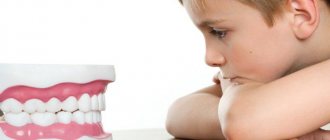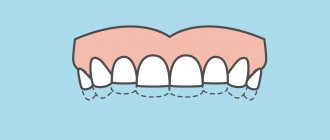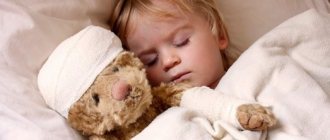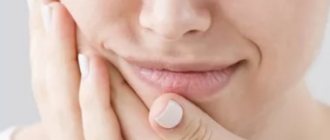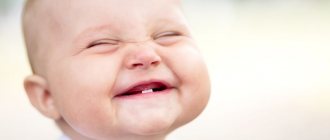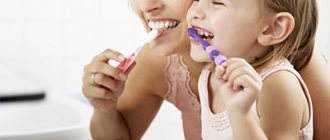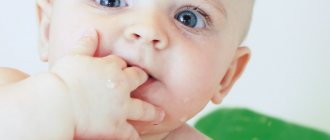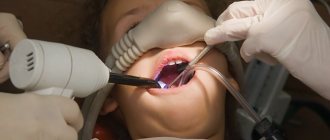Teeth grinding, which is medically called “bruxism,” is a fairly common phenomenon. Many parents observe it in their children. Adults can also grind their teeth, but bruxism is much more common among children.
In most cases, children grind their teeth during night sleep, but you should know that experts distinguish not only the nighttime, but also the daytime form of this disorder. The latter is observed very rarely and indicates more complex problems that require a comprehensive examination of the entire body. But there is no need to panic. Doctors do not consider bruxism a disease, but attribute it to such phenomena as sleepwalking, snoring and apnea.
What can cause teeth grinding in a child? Let's figure it out.
Minor defect?
Grinding of teeth in a child may seem like a minor deviation from the norm only at first glance. It’s good when this phenomenon is temporary and at the age of 5–6 years, bruxism in a child goes away on its own. But if your first-grader continues to grind his teeth at night, don't hesitate to seek medical help. Otherwise, even the permanent teeth that will replace the milk teeth will be at risk.
Bruxomania - teeth grinding while awake
Young children under 3 years of age may grind their teeth during the day if they are teething. So, by squeezing and unclenching their jaws, they try to get rid of the unpleasant sensation in the gums.
Involuntary grinding can also occur due to the fact that the lower row of teeth protrudes more forward or the upper row of teeth hangs excessively over the lower one. If, when closing the jaw, gaps are visible between the teeth, the baby is grinding due to an incorrectly formed bite.
Correct bite is not the norm, but rather the exception. 10% of the adult population can boast of a beautiful smile, while for everyone else, problems with the dental system develop in childhood.
Children over 3 years of age who do not have bite problems suffer from bruxomania if they have an extremely excitable nervous system or a stressful environment.
Symptoms of childhood bruxism
- Headache in the morning
- Feeling of fullness in the ears
- Complaints of pain in the back
- Unmotivated irritability and tearfulness
- Restless sleep with frequent crying
- Lack of appetite
- Rapid tooth wear (this symptom can only be determined by a dentist during an examination!)
Attention!
A high temperature and grinding of teeth in a child may be a reaction of the body to a routine vaccination carried out the day before.
What happens if the disease is not treated?
As already mentioned, isolated cases of bruxism do not pose a health hazard. But regular grinding can cause irreparable harm. Consequences:
- abrasion of tooth enamel;
- increased tooth sensitivity;
- chipping, crumbling, destruction and, as a result, loss of dental elements;
- development of caries;
- injury to the tongue and the inner surface of the cheeks and lips;
- damage to the temporomandibular joint;
- gastrointestinal diseases (due to impaired chewing of food);
- the appearance of chronic fatigue syndrome;
- constant headache;
- dizziness;
- facial asymmetry.
Causes of teeth grinding in children
Switching to artificial feeding
Teeth grinding in a child aged 8–10 months may be associated with early weaning from the mother's breast. This is extremely stressful for the baby. According to statistics, it is male “artificials” who most often suffer from bruxism. In this regard, increased attention should be paid to ensuring that the baby receives breast milk in full for as long as possible. To do this, the mother is advised to maintain a drinking regime, regularly express excess milk and avoid worries.
Teeth cutting or changing teeth
Teeth grinding during the day, which parents can notice by a specific sound, usually appears after the eruption of another baby tooth. The child is simply curious about new sensations, and he “plays”, deliberately creating friction between the teeth. As a rule, he quickly gets bored with this, but years later, when baby teeth are replaced with permanent ones, the picture may repeat. Read more about teething in this article.
Dental pathologies
When a child turns one year old, teeth grinding may indicate the presence of some abnormalities in the functioning of the dental system. An incorrect bite, inflammation of the jaw or pathological development of the joint are reasons to “grind” in order to more conveniently position the teeth in the mouth. Only an orthodontist can determine the specific cause. Read more about this here.
Stressful situations
If the day has come and a child of 2–3 years old does not stop grinding his teeth, this is a signal of a problem in his nervous system. In this way, the baby reacts to the stress he has experienced. The trigger for this can be both strong negative emotions (separation from a favorite toy, starting a visit to kindergarten or “eviction” from the parents’ bed), as well as positive ones that lead to strong overexcitation (outdoor games, the arrival of relatives with other children, etc.) .
Sleep disturbance
If a child has difficulty falling asleep, snores, mumbles in his sleep, suffers from enuresis or somnambulism, this may cause teeth grinding at night. Inadequate sleep negatively affects the child’s body and is a trigger for spasms of the masticatory muscles. The task of parents is to ensure that the baby gets enough sleep.
Wrong diet
Sometimes the reasons for teeth grinding in a child’s sleep lie on the surface - the parents themselves are responsible for this, having failed to create an optimal feeding regime. In order not to provoke involuntary contractions of the masticatory muscles, the last meal should be completed 2 hours before going to bed. Kefir is allowed 1 hour before bedtime.
Avitaminosis
Are you looking for reasons why your child grinds his teeth during the day? Analyze how much vitamins and minerals he receives from food during breakfast, lunch, afternoon snack and dinner. A deficiency of B vitamins, coupled with insufficient intake of magnesium and calcium into a growing child’s body, can lead to overstrain of the masticatory muscles. Only a pediatrician should determine the required dosage of a particular vitamin after an examination.
Upper respiratory tract diseases
Coughing and grinding of teeth in a child along with nasal congestion are a characteristic manifestation of sinusitis or bronchitis. In this case, bruxism will go away as soon as the disease that caused it is cured. If you notice that your cough does not go away, despite all the traditional measures taken to combat it, then do not delay a visit to an infectious disease doctor.
ENT diseases
Grinding of a child's teeth at night is also one of the main symptoms of adenoiditis - inflammation of the tonsils. The complex of unpleasant sensations caused by an increase in the size of the adenoids literally forces you to grind your teeth. The first thing that should alert parents in this situation is a constantly slightly open mouth.
The famous pediatrician Komarovsky claims: bruxism in children is more likely to occur if their parents suffered from it in childhood!
DIAGNOSIS AND TREATMENT OF BRUXISM
If parents notice that the baby grinds his teeth in his sleep, but there are no obvious reasons for bruxism, the child should be shown to specialists. The best place to start is to go to the pediatrician. The doctor will collect anamnesis and conduct a general examination. Additional consultation may be required from:
- dentist;
- orthodontist;
- neurologist.
Modern pediatricians tend to put bruxism on a par with conditions such as sleepwalking (sleepwalking) and nocturnal enuresis. If creaking occurs frequently during sleep, bruxism requires treatment. At such moments, some processes in the child’s body are disrupted - breathing and heartbeat quicken, blood pressure rises, and other important indicators may go wrong. If the pathology is not treated, negative health consequences are possible.
It is also necessary to determine whether grinding teeth during sleep is one of the signs of epilepsy. For this purpose, a polysomnographic study is prescribed, during which the movements of the muscles of the sleeping baby are recorded. Convulsions during epilepsy can also lead to spasms of the facial muscles, which may be accompanied by teeth grinding.
Special sensors are attached to the child’s body to monitor the functioning of the brain, heart, and movements of the temporomandibular joint. The study is accompanied by video recording.
If bruxism is caused by a neurological pathology, the doctor prescribes anticonvulsants, brain metabolites, and nootropics. When prescribing the drug, electroencephalogram data must be taken into account.
PHYSIOTHERAPEUTIC TREATMENT
Physiotherapeutic procedures improve the child’s psycho-emotional functioning and have a positive effect on the condition of the chewing muscles and neck muscles. For this purpose, ultrasound devices and magnetic therapy are used. Modern methods include neuroelectric stimulation of facial muscles.
WEARING A MOUTH WEARING
Baby teeth are not very hard, so with frequent pressure and grinding they begin to break down. When the first signs of enamel wear appear, you must order a protective mouth guard from your dentist, made taking into account the individual characteristics of the baby. The device is made of biocompatible plastic. With the help of a mouth guard you can:
- prevent tooth wear;
- relieve tension in the chewing muscles;
- ensure normal functioning of the jaw joint.
The design must be very precisely selected. Only in this case will it provide the desired effect.
RELAXING THE FACIAL MUSCLES
A set of relaxing exercises for the face is called myogymnastics. The method is used as an auxiliary method in addition to the main method of treating bruxism. An integrated approach always gives the best results. Of course, this technique is not suitable for a one-year-old baby, but with children 4-5 years old it is quite possible to conduct classes every day before bed.
The first successes become noticeable after 1-2 weeks. There are several types of myogymnastics for the face. Similar complexes have been developed by domestic and foreign specialists. Videos of exercises are easy to find on the Internet. Very young children can have their lower face massaged using stroking movements.
LOADING THE MASTING MUSCLES
To avoid hypertonicity of the child’s masticatory muscles at night, it is necessary to load them as much as possible during the day. The baby should be offered healthy solid food in the form of an apple, carrot, or dried bread. During the chewing process, the muscles will receive a discharge. During the active phase of teething, the baby is given special rubber toys to chew on - teethers.
What to do if your child grinds his teeth?
- The first step is to make an appointment with a dentist and pediatric neurologist. The first will give practical recommendations on how to prevent enamel wear, the second will determine why the child has teeth grinding.
- Monitor the psychological microclimate in the family. The child should be honest about his worries and be sure that he will receive help from his parents.
- Adjust your daily routine. An hour before going to bed, the child should be occupied with a calm activity to avoid overstimulation of the nervous system.
- Balance the children's menu. The daily diet should include solid vegetables and fruits - the load on the masticatory muscles during wakefulness will lead to their relaxation during sleep.
- Teach self-control. In the form of a joint game, practice every day following the simple rule: “Lips are closed, teeth are apart.” This way, the baby will not form the bad habit of clenching his teeth during the day, even at the moment of strong excitement.
How to get rid of bruxism: tips
To reduce the frequency of grinding noise to a minimum, the following steps can be recommended:
- reduce stress (it is recommended to take a hot, relaxing bath before bedtime);
- do not drink strong tea and sweet soda in the afternoon, try not to smoke and drink alcohol;
- get enough sleep;
- apply compresses to the muscles responsible for chewing;
- try to get rid of habits that stimulate the chewing muscles (do not chew stationery, nails, do not buy chewing gum);
- control clenching of your teeth during the day (if you are used to clenching your lips tightly, try holding your tongue between your teeth - this practice will teach your jaw muscles to relax).
Prevention measures
Of course, when a child grinds his teeth, parents are interested in whether it is possible to somehow prevent the development of the disease? Unfortunately, today there is no specific prevention of bruxism. But if you follow simple rules, it is quite possible to minimize the risk of its occurrence.
- Pay attention to hygiene
The banal advice is not without common sense. Judge for yourself: a common cause of bruxism is a defensive reaction to the eruption of a new tooth. During the process, the gums become inflamed and mild itching may occur. It is advisable to give your child special teethers made of safe materials so that he does not rub his teeth against each other. Also, do not ignore brushing your teeth with special fingertips.
- No stress!
Do you want your child to avoid grinding his teeth all night long and then all day long? Eliminate any nervous stress from his life. It is generally accepted that only what happens directly to him can have a negative impact on the baby’s psyche. In fact, your quarrel with your spouse or a loud conversation on the phone with a work colleague can negatively affect his mood.
- Fight bad habits
Today, any doctor will tell you that the causes of teeth grinding are both an incorrect bite and a fixed pathological reflex, for example, sucking a pacifier to calm down in a stressful situation. Therefore, it is worthwhile to gently but decisively fight childhood bad habits and promptly consult an orthodontist if necessary.
How to treat?
Usually no special treatment is required. As noted above, in most children the disease goes away on its own during adolescence. And adults who have discovered such an illness in themselves, as a rule, do not clench their jaws with such force that intervention is required. But, of course, only a doctor can decide on the need for treatment, so an examination by a specialist is required.
The choice of treatment will depend on the severity of the disease and the reason for which it occurred. Sometimes, if the dentist believes that the main reason is psychological, he may advise you to consult a psychiatrist. He will prescribe medications that will help reduce anxiety and improve sleep.
Treatment of bruxism using dental methods
Clenching your jaw with great force can lead to tooth decay and wear, which can lead to serious problems. There are ways that, if they don’t stop bruxism, then at least minimize the consequences of this unpleasant phenomenon:
- Wearing a mouth guard. Such caps, made of polymers or acrylic, can protect teeth from damage. They are used mainly only during sleep.
- Grinding of teeth. One of the causes of the disease is the incorrect relationship between the surfaces of the teeth in the upper and lower rows. To create proper contact between teeth, your dentist may suggest a selective grinding procedure.
- Prosthetics is a method appropriate if tooth decay is too great. To restore them and prevent recurrence of destruction, crowns are used.
Treating bruxism with medication
Medicines are not particularly effective, but sometimes (with increased activity, nervousness) they can help.
Groups of drugs used to treat bruxism:
- Medicines that reduce muscle tone (they are taken before bed, the course of administration has strict limits). You need to understand that such tablets are available by prescription and have a negative effect on reaction speed, which can be very dangerous for drivers and people working with technological equipment.
- Botox injections. If all other treatment methods do not have the desired effect, you can try injecting Botox directly into the muscles of mastication. The desired concentration of the drug will change the strength of muscle contraction.
What causes bruxism?
The following predisposing factors are known:
- sleep disorders - parasomnias and obstructive sleep apnea, sleepwalking, sleep talking, and nocturnal enuresis
- anxiety and other mental and neurological disorders (Down syndrome, cerebral palsy, attention deficit hyperactivity disorder (ADHD). Moreover, the mother’s condition is also very important - there are scientific works where they found a connection between bruxism and maternal depression
- some medications, in teenagers - caffeine, smoking and alcohol
- enlarged adenoids and tonsils, which also lead to mouth breathing during sleep, snoring and sleep apnea. In children who had to have their adenoids and tonsils cut (surgery “adenotonsillotomy”), 3 months after the operation, not only a significant improvement in nasal breathing was described, but also a decrease in bruxism.
- family predisposition
- reflux disease
Diagnostic features
The doctor determines the fact of night grinding from the words of the child’s parents or close relatives, but it is important to confirm the diagnosis. The following methods are used for diagnosis:
- polysomnography. The procedure involves fixing special sensors on the child’s body that record changes during sleep. Allows you to assess the functional state of the nervous system;
- EEG. Makes it possible to evaluate the electrical activity of the brain, identify epilepsy and other disorders;
- electromyography. This method of assessing the function of the masticatory muscles is based on the impact of electric current. The procedure is painless and allows you to determine excess muscle tone;
- Brooks Checker. Special aligners made from a cast of the patient's jaw are installed overnight, after which the diagnostic plates are sent to the clinic for analysis. This method allows you to determine which teeth suffer from increased occlusal load and whether it occurs in general.
It is important to understand that these measures may not be enough to identify the true causes of the problem. In some cases, laboratory diagnostics are required: general blood tests, determination of hemoglobin levels, mineral content and other components. It may also be necessary to involve other specialized specialists: otolaryngologist, neurologist, psychotherapist, gastroenterologist.
Helping children with bruxism
Whether the cause is physical or psychological, children can control bruxism by relaxing before bed—for example, taking a warm bath or shower, listening to soothing music for a few minutes, or reading a book. For infants who are teething, you can offer them a pacifier. She will calm the baby and give a light massage to the gums.
If you are teething or have an ear infection, ask your doctor to prescribe the correct dose of ibuprofen to relieve discomfort.
If teeth grinding is caused by stress, ask about what is upsetting your baby and find solutions.
In rare cases, when stressful situations cannot be resolved within the family circle and sleep problems arise, the help of a psychologist is required. He will help you find the cause of stress and prescribe the right course of treatment.
There is not as much work on the connection between reflux and bruxism as we would like.
The most comprehensive selection of studies is presented in a 2022 article, where this connection is confirmed.
Associations among Bruxism, Gastroesophageal Reflux Disease, and Tooth Wear
But so far there is no clear evidence that reflux specifically leads to the development of bruxism.
It is possible that these conditions influence each other and also work together to increase dental damage.
Mechanical damage to enamel is aggravated by the destruction of organic substances in dentin by acid and digestive enzymes of liquids thrown from the stomach.
Reflux usually affects the palatal surfaces of the upper teeth.
The lower teeth suffer less - they are partially covered from acid by the tongue.
Also, saliva, which protects the enamel, accumulates near the lower teeth.
Important reminder.
Bruxism is primarily a nocturnal problem.
Gastroesophageal reflux also intensifies at night during sleep in many people:
- gravity helps casting less
- saliva is swallowed less frequently, which washes away the acid from the mucous membranes
- There is significantly less saliva produced at night
What kind of phenomenon is bruxism?
Oscar [email protected]
During sleep we must rest.
Our chewing muscles should also rest - their work is completely unnecessary during sleep.
But sometimes the chewing muscles suddenly begin to work during sleep, forcing a person to clench his jaw or grind his teeth.
This is bruxism .
It usually occurs at night, although daytime bruxism also occurs occasionally.
Episodes of bruxism usually last about 4 seconds and can occur 5-6 times per hour of sleep.
Conclusions:
There are two most likely ways to find out about the presence of bruxism - by accidentally hearing the grinding of teeth in a sleeping person, or during a dental examination, detecting signs of increased tooth wear and starting to specifically look for the causes.
Less commonly, the diagnosis of bruxism is led by searching for the cause of damage to the jaw joints or unusual headaches.
When a diagnosis of bruxism is made, it is logical for the dentist to conduct a survey about complaints typical of gastroesophageal reflux disease. Or a person suffering from bruxism can independently find a questionnaire like the one presented below
An example of a questionnaire prepared by the manufacturer of one of the most popular drugs for the treatment of reflux
Next is a consultation with a gastroenterologist and a course of treatment.
A more difficult question is whether bruxism can occur against the background of asymptomatic reflux disease (this also happens)?
Maybe. But there are no algorithms for this situation. Each time, the doctor will have to individually weigh the pros and cons of treatment or non-treatment.
1, total, today
